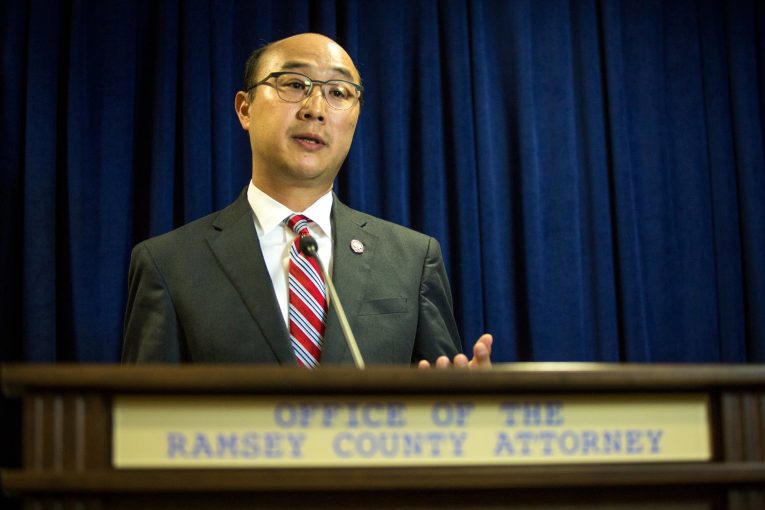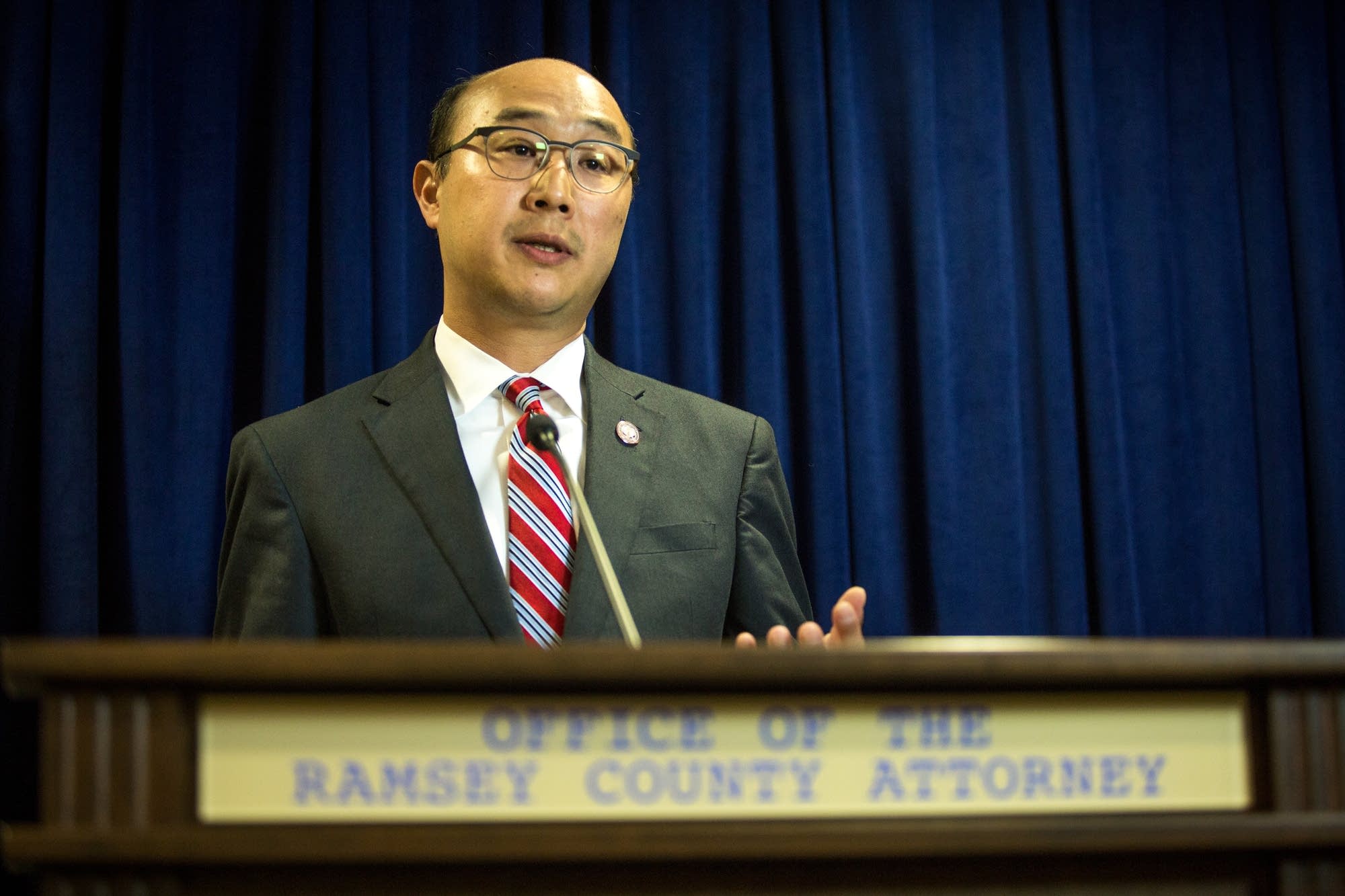

A year ago, President Trump created the Presidential Commission on Law Enforcement and the Administration of Justice, asking for a report within a year. Now John Choi, the elected prosecutor in Ramsey County, Minnesota, has announced his resignation from the commission, expressing concerns that it was “intent on providing cover for a predetermined agenda that ignores the lessons of the past” and will issue a final report that “will only widen the divisions in our nation.”
Back in May, the ACLU protested the group, writing to the DOJ “its concern that this body is little more than a sham commission formed only for the purposes of advancing a ‘Thin Blue Line’ law and order agenda.”
The May 27 letter, literally two days after the death of George Floyd in Minnesota, cited the group’s concern with the commission’s “failure to address police violence, which disproportionately impacts people and communities of color, and coincided with several high profile fatal police shootings,” its “disregard for the COVID-19 pandemic” and its “attacks on reform oriented prosecutors.”
The commission is stacked with members of law enforcement, leading to questions about its representativeness.
In his September 3, 2020, resignation letter, he cited a previous letter, written May 29, 2020, four days after the death of Floyd.
At that time, he cited concerns raised by the NAACP and other organizations about the commission’s “process, inclusiveness and transparency.”
He wrote, “Questions have been raised as to whether the Commission’s final report, and the recommendations it advances, will sufficiently recognize and be responsive to the issue of racial disparities in policing and the justice system, as well as the inequities of the cash bail system and ongoing concerns about the erosion of trust in law enforcement and the justice system within communities of color.”
Most concerning, he wrote, “is language in the President’s Executive Order as well as the charge of the Respect for Law Enforcement working group suggesting there may be language in the Commission’s final report that would seek to erode local prosecutorial discretion.”
This has become an issue of particular concern, given attacks on local discretion in St. Louis by the governor, AG, legislator and the President, as well as in Virginia.
Choi writes, “Communities across our country, including our own, have benefitted tremendously from efforts by elected DAs to implement evidence-based reforms, which enable the strategic and smart use of scarce prosecutorial resources only where justice system involvement is necessary.”
He adds, “We are very concerned that the role of prosecutors as independently-elected officials and ministers of justice could well be undermined by recommendations diminishing the exercise of that discretion.”
Since May, Choi said, “I have yet to receive any response to the issues I raised and have grown increasingly concerned that the final report will only widen the divisions in our nation.”
The Justice Department pushed back with an official claiming in media accounts that Choi really didn’t resign, because the group completed their work. Former US Attorney Jay Town, in an interview with the media, claimed that Choi offered “very little in substance” while Cook County Judge William O’Brien said his opinions “didn’t have a lot of depth.”
But, if anything, the issues raised in May have become more acute.
Choi writes in September that “many reform-minded prosecutors are choosing not to prosecute minor crimes, like sleeping on the street or possessing marijuana, in favor of devoting their limited resources to investigating and prosecuting serious cases.”
Choi adds, “A prosecutor has every right and obligation to exercise their discretion to conform with the justice and public safety values of their community, just as you have purported to do, on behalf of our nation, as you and the Department of Justice have handled the prosecution and sentencing of Michael Flynn.”
Choi urged that “we needed to listen to those who have been negatively impacted by policing and the criminal justice system. In fact, one of the most elusive solutions in the United States today is how we bridge the great divide between law enforcement and the communities they are tasked to protect.
“I was eager to join this effort because I believed it had the potential to play a critical role in helping our country reckon with the massive racial and economic disparities that exist – both with respect to how people are policed and protected – in America,” he wrote. “However, this process was a missed opportunity to seriously deliberate in regard to areas for improvement in law enforcement and  develop thoughtful solutions to address longstanding problems in the criminal legal system.”
develop thoughtful solutions to address longstanding problems in the criminal legal system.”
The attack on progressive prosecutors is particularly noteworthy, given the trajectory of criminal justice reform and success that progressive prosecutors have had over the last few years.
The commission, according to various accounts, focused heavily on “the trend of diminished respect for law enforcement and the laws they enforce.”
The “Respect for Law Enforcement” working group evaluated how “under-enforcement of the criminal law in certain jurisdictions” affects “public safety; public perception of law enforcement and the laws they enforce; police resources and morale; the rule of law.”
Essex County, Massachusetts, District Attorney Jonathan Bloggett, who was one of the chairs of that working group, has said he believes that the progressive prosecutor movement is “being driven by slogans and cliches.”
Indeed, he found himself in confrontation with Suffolk DA Rachael Rollins, when he and three other prosecutors attempted to intervene in her case involving how new research on the brain development of young adults should impact sentencing.
Hearings on respect for law enforcement featured, among others, US Attorney McGregor Scott, who serves the Eastern District of California. He told the commission, similar to his comments in San Francisco in February, that progressive prosecutors placed “a higher value on the perpetrators of crime than on the victims of crime.”
In his letter, Choi noted that in July, US Attorney William McSwain took the stage to blame local prosecutors for rising crime. Mr. McSwain claimed “so-called progressive prosecutors have …little regard for the public safety,” and as a result, “[c]riminals bank on the fact that certain progressive policies … give them… breathing room to ply their trade.”
Choi writes: “While that could not be further from the truth, Mr. McSwain was invited to testify before the Commission while many of those with contrary evidence were not.”
The commission is set to issue a final report, perhaps in the final days before the election, which—given the trajectory of the campaign and the commission—may feed into existing narratives about law and order.
—David M. Greenwald reporting
To sign up for our new newsletter – Everyday Injustice – https://tinyurl.com/yyultcf9

